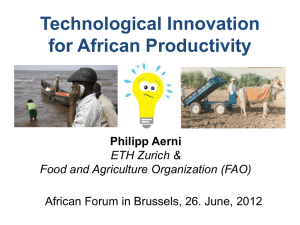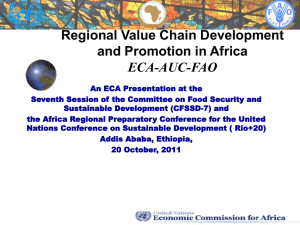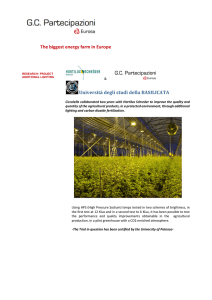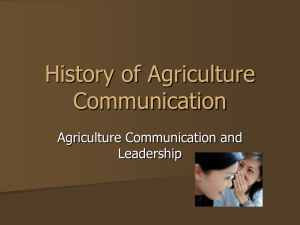Data for Development: Evidence and Policy
advertisement
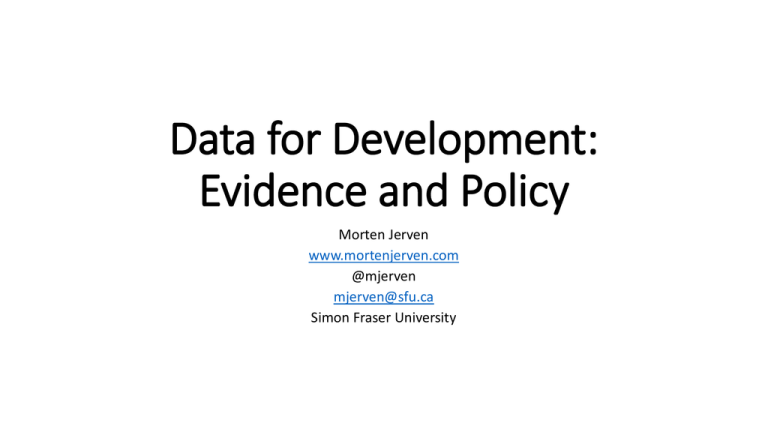
Data for Development: Evidence and Policy Morten Jerven www.mortenjerven.com @mjerven mjerven@sfu.ca Simon Fraser University Outline • A knowledge problem • Data for Agricultural Development • Knowledge and Governance • Big data & technological solutions • A way forward A Knowledge Problem The Symptom of a Knowledge Problem • On the 5th of November, 2010, Ghana Statistical Services announced that its GDP for the year 2010 was revised to 44.8 billion cedi, as compared to the previously estimated 25.6 billion cedi. • This meant an increase in the income level of Ghana by about 60 percent and, in dollar values, the increase implied that the country moved from being a low income country to a middle income country overnight. • Undoubtedly – This good news, but a knowledge problem emerges. Reactions • Todd Moss at CGD: Boy we really don’t know anything! • Andy Sumner and Charles Kenny in the Guardian: Ghana escapes the ‘poverty trap’. Paul Collier and Dambisa Moyo are wrong! • UNDP in Ghana: It is a statistical illusion. • Shanta Devarajan, World Bank Chief Economist for Africa: declares Africa’s statistical tragedy. Is Africa much richer than we think? Nigeria just announced the GDP figures – GDP almost doubled… In 2012 I guesstimated (in African Affairs) that GDP in Nigeria was underestimated that were about 40 ‘Malawis’ unaccounted for inside Nigeria… Is Africa much richer than we think? Nigeria just announced the GDP figures – GDP doubled… In 2012 I guesstimated (in African Affairs) that GDP in Nigeria was underestimated that were about 40 ‘Malawis’ unaccounted for inside Nigeria… Turns out there were 58… Poor Numbers 1. What Do We Know about Income and Growth in Africa? 2. Measuring African Wealth and Progress 3. Facts, Assumptions, and Controversy: Lessons from the Datasets 4. Data for Development: Using and Improving African Statistics Knowledge & Governance Our knowledge based on statistics is doubly biased – we know less about poor economies, and we know less about the poor people who live in poor economies. • Where does this leave ‘evidence based policy’ in development? (evidence plays a role in formulating, following and evaluating policy) • Statistical priority signals policy priority. Lack of data may mean lack of policy. Example: no data on agricultural food production = no policy on food production etc... The knowledge problem in Agricultural Statistics in African countries • African Development Bank 2013 report on GDP statistics: “Few countries conduct regular surveys or censuses of agriculture” • FAO Agricultural bulletin board on data dissemination and quality of statistics: only two African countries are considered to have high standards in data collection, while standards in 21 countries remain low. • ‘very few studies permit direct comparison over time using comparable measures’ (Foster and Rosenzweig 2015) • ‘Past investments and technical assistance efforts in the area of agricultural statistics have failed to produce sustainable systems, while existing statistics continue to suffer from poor quality, lack of relevance, and little use in national policy dialogues’ (Binswanger, 2008). • ‘the existing lack of consensus on protocols and standards has resulted in agricultural statistics that suffer from uncertain quality, poor comparability and low credibility’ (Carletto et al 2015) Knowledge and Governance: Knowledge questions: 1. Do fertilizers work? 2. Are some parts of the agrarian economy growing fast? Knowledge and Governance Knowledge questions: Governance Questions: 1. Do fertilizers work? 1. Is our fertilizer subsidy program profitable and equitable? 2. Are some parts of the agrarian economy growing fast? 2. Are rural living standards increasing? Fertilizers: do they work? Scholarly Knowledge Solution: Duflo et al (2008) did a randomized controlled trial with smallholders in Kenya – gave some farmers no fertilizer, some too little, some just right, and some too much. “fertilizer, when used in appropriate quantities, is highly profitable” Political Governance Problem: Malawi had what was thought to be a successful fertilizer subsidy program. Jeffrey Sachs in New York Times: “Farm yields soared once nitrogen got back into the depleted soils” Jerven (2013) documents: for 2006/7 MoA data showed: 3.4 million metric tonnes of maize, but 2006/7 census showed 2.1 million. Why: per capita vouchers (ghost farmers: discrepancy of 1 million housholds) and yields (NSO: 1.6; MoA: 2 FAO: 2.7 (000’kg p ha) Traditional Sources of Knowledge • Administrative data • Agricultural Census • Agriculture Surveys Traditional Sources of Knowledge • Administrative data • Unreliable – may be subject to political pressure. Lack of resources and unclear standards of reporting. • Agricultural Census • Expensive. • Agriculture Surveys • Depends on recall. Diaries show that recall is weak. Design yields technical (yet inaccurate) answers, that are not always relevant for policy. • Other issues: livestock data, price and difficulty of measuring small areas correctly. Counting Crops Calogero Carletto, Dean Jolliffe & Raka Banerjee in “From Tragedy to Renaissance: Improving Agricultural Data for Better Policies” in Morten Jerven and Deborah Johnston (2015) “Statistical Tragedy in Africa? Evaluating the Data Base for African Economic Development”, Special Issue in the Journal of Development Studies. Counting Crops Calogero Carletto, Dean Jolliffe & Raka Banerjee in “From Tragedy to Renaissance: Improving Agricultural Data for Better Policies” in Morten Jerven and Deborah Johnston (2015) “Statistical Tragedy in Africa? Evaluating the Data Base for African Economic Development”, Special Issue in the Journal of Development Studies. Counting Crops Calogero Carletto, Dean Jolliffe & Raka Banerjee in “From Tragedy to Renaissance: Improving Agricultural Data for Better Policies” in Morten Jerven and Deborah Johnston (2015) “Statistical Tragedy in Africa? Evaluating the Data Base for African Economic Development”, Special Issue in the Journal of Development Studies. Counting Crops Calogero Carletto, Dean Jolliffe & Raka Banerjee in “From Tragedy to Renaissance: Improving Agricultural Data for Better Policies” in Morten Jerven and Deborah Johnston (2015) “Statistical Tragedy in Africa? Evaluating the Data Base for African Economic Development”, Special Issue in the Journal of Development Studies. Measuring growth from space? “Instead of writing large grants, spending days traveling to remote field sites, hiring and training enumerators, and dealing with inevitable survey hiccups, what if instead you could sit at home in your pajamas and, with a few clicks of a mouse, download the data you needed to study the impacts of a particular program or intervention?” Florence Kondylis, Measuring Yields from Space, Published on Impact Evaluations (http://blogs.worldbank.org/impactevaluations) Big data and technology: promises and problems Quick wins: reducing costs in recording (GPS mapping) and reporting (connected handheld devices) and data processing. Big data and technology: promises and problems Quick wins: reducing costs in recording (GPS mapping) and reporting (connected handheld devices) and data processing. But: Problem 1: need prior knowledge: “To measure outcomes at the level of the individual farm plot, satellite-based measures will be most easily employable if the researcher already knows the plot boundaries and knows what crop is being grown.” Big data and technology: promises and problems Problem 2: Measurement errors: “This almost certainly means that this technology will not be equipped to discern small effects” & “satellite imagery was generally too coarse to resolve the very small plot sizes (e.g. less than half an acre) common in much of Africa.” Problem 3: “Even with plot boundaries in hand and well-powered study, satellites are going to have a hard time measuring many of the other outcomes we care about – things like profits or consumption expenditure.” (Solvable with mobile phones data? Unrepresentative sample big problem) Problem 4: Applying these approaches in low income countries is hard “because of a lack of either (i) ground truth data to develop the satellite-based predictions, and/or (ii) a satisfactory mechanistic understanding in these environments” Big Questions for Big Data and International Development • How do you overcome the need for a benchmark? (Even Billion Price Projects at MIT still measures its success by how close it is to the official CPI) • How do you overcome sample bias (the uncounted in official statistics are also uncounted in Big Data) • How do you get policy makers and statistical officers to entrust data availability and validity and trends with commercial operators (Google or Orange) and how do you coordinate the operators? The way forward • Priority: how high is a) statistics b) agriculture and c) agricultural statistics on the agenda. • Integration: FAO and MoA statistical activities more closely integrated in the system of social and economic statistics. • Technology: a long process of small studies and trial and error awaits. • What do we need to know? Wages, labour relations, assets and land distribution matters too – not only yields and productivity. • Realism: not all that counts can be counted. There are other ways of knowing than through counting. • Warning: evidence based policy (or the donor version: ‘paying for results’) often turns into policy based evidence
